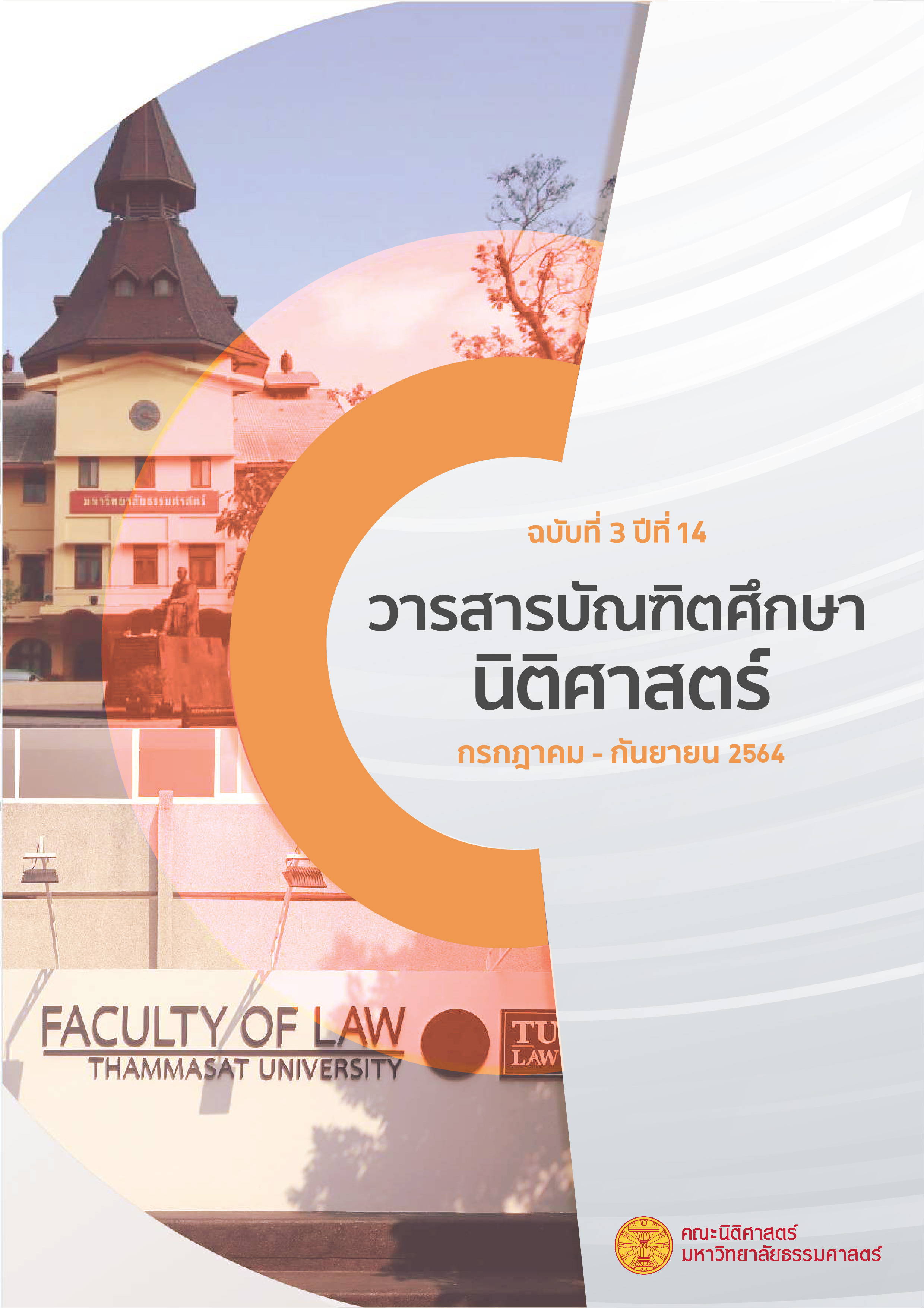LEGAL MEASURES TO PROTECT THE ACCUSED AND DEFENDANTS’ RIGHTS : A CASE STUDY OF THE ELDERLY IN AMERICAN AND JAPANESE LAWS
Abstract
This article examines a problem related to legal measures to protect the rights of aging offenders and the accused in criminal prosecution. The transformation of a contemporary society into an aged one across the planet brings particular attention to policy-makers, law drafters and the academia. In Thailand, statistics published in the Annual Judicial Report by the Office of the Judiciary demonstrate that the increasing number of older defendants has been occurred since 2014 (B.E. 2557). Its figures show that more than 25,000 defendants were the aged. And in certain years, the number moved up beyond 30,000. The implication of these soaring numbers of the grey-haired population should therefore be under the spotlight not only because of their health-related problems such as heart disease and diabetes, but also mental disorders they come to confront during long and complex criminal prosecution process. Owing to this significance, this article will explore measures in law being currently applicable to the protection of elderly offenders and the accused’s rights in the United States and Japan as compared to those in a Thai legal system. The result of this analysis reveals that neither legal substance nor procedure in the United States and Japan being precisely applicable to the aged. There are; however, laws related to the vulnerable that can be applied to this kind of the convicted, and can certainly
be practicable to the Thai justice.
References
คณิต ณ นคร, กฎหมายวิธีพิจารณาความอาญา (พิมพ์ครั้งที่ 9, สำนักพิมพ์วิญญูชน, 2561).
ณรงค์ ใจหาญ, หลักกฎหมายวิธีพิจารณาความอาญา เล่ม 2 (พิมพ์ครั้งที่ 6, สำนักพิมพ์วิญญูชน, 2563).
ราชบัณฑิตยสถาน, กฎหมายตราสามดวง ฉบับราชบัณฑิตยสถาน (พิมพ์ครั้งที่ 1, อมรินทร์พริ้นติ้งแอนด์พับลิชชิ่ง,
2550).
สุรศักดิ์ ลิขสิทธิ์วัฒนกุล, ประมวลกฎหมายวิธีพิจารณาความอาญา (ฉบับอ้างอิง) (พิมพ์ครั้งที่ 20, สำนักพิมพ์วิญญูชน, 2563).
อุทัย อาทิเวช, ทฤษฎีอาชญาวิทยากับกระบวนการยุติธรรมทางอาญา (ห้างหุ้นส่วนจำกัด วี.เจ.พริ้นติ้ง, 2557).
งานวิจัย
ณรงค์ ใจหาญ และคณะ, ‘รายงานการศึกษาวิจัยฉบับสมบูรณ์เรื่องสิทธิผู้ต้องหา จำเลยและผู้ต้องโทษในคดีอาญา’ (เสนอต่อสำนักงานคณะกรรมการกฤษฎีกา, 2540)
บทความ
ภาษาไทย
อัมพล สูอำพัน, ‘สุขภาพจิตของเด็กพิการ’ (2530) 12 จุฬาลงกรณ์เวชสาร 1001.
ภาษาต่างประเทศ
Anita N. Blowers, ‘Elders and the criminal justice system’ (2015) 1 Journal of Crime and Justice 1.
Anita N. Blowers and Jill K. Doerner, ‘Sentencing outcomes of the older prison population: an exploration of the age leniency argument’ (2013) 1 Journal of Crime and Justice 3.
Clinton W. Terry III and Pamela Entzel, “Police and Elders.” in Max B. Rothman and others (eds) Elders, crime, and the criminal justice system: Myth, perceptions, and reality in the 21st century, (Springer Publishing, 2004).
Dancig-Rosenberg, Hadar, and Netanel Dagan, ‘Retributarianism: A new individualization of punishment’ (2019) 1 Criminal Law and Philosophy 129.
Kelly Porcella, ‘The past coming back to haunt them: the prosecution and sentencing of once deadly but now elderly criminals’ (2007) 1 St.John’s Law Review 369.
Morrow J. Weston, Vickovic G. Samuel, and Fradella F. Henry, ‘Examining the prevalence and correlates of a ‘senior citizen discount’ in US federal courts’ (2014) 4 Criminal Justice Studies 1.
Peter C. Kratcoski and Edelbacher Maximilian, ‘Trends in the criminality and victimization of the elderly’ (2016) 1 Federal Probation 58.
Smith MS, Schriver JL, ‘Judges’ sentencing decisions with older offenders’ (2018) 2 Psychology, Crime & Law 1.
Stacey Steele, ‘Elderly Offenders in Japan and the saiban’in seido (Lay Judge System): Reflections Through a Visit to the Tokyo District Court’ (2015) 2 Japanese Studies 223.
สื่ออิเล็กทรอนิกส์
ภาษาไทย
กรมกิจการผู้สูงอายุ, ‘สถิติผู้สูงอายุของประเทศไทย ณ วันที่ 31 ธันวาคม 2562’ <http://www.dop.go.th/th/know/side/1/1/275> สืบค้นเมื่อ 1 กุมภาพันธ์ 2563.
นัทธี จิตสว่าง, ‘การกระทำผิดของผู้ต้องขังหญิงสูงอายุของไทย’ <https://bit.ly/2ZVx3M6> สืบค้นเมื่อ
20 พฤษภาคม 2563.
มูลนิธิสถาบันวิจัยและพัฒนาผู้สูงอายุไทยร่วมกับโครงการประเมินเทคโนโลยีและนโยบายด้านสุขภาพ ‘ยากันลืม คู่มือป้องกันโรคสมองเสื่อมในผู้สูงอายุ’ <https://bit.ly/3erAn5Y> สืบค้นเมื่อ 5 พฤษภาคม 2563.
วีรศักดิ์ เมืองไพศาล, ‘เกณฑ์ในการวินิจฉัยภาวะสมองเสื่อม’ คณะแพทยศาสตร์ศิริราชพยาบาล <https://www.si.mahidol.ac.th/project/geriatrics/network_title1_2.html#> สืบค้นเมื่อ
5 พฤษภาคม 2563.
สำนักงานศาลยุติธรรม ‘รายงานสถิติคดีของศาลยุติธรรมประจำปีพุทธศักราช 2553 - 2562 (ฉบับภาษาไทย)’ <https://oppb.coj.go.th/th/content/category/articles/id/8/cid/2085> สืบค้นเมื่อ 10 กุมภาพันธ์ 2563.
ภาษาต่างประเทศ
OECD, ‘Elderly population (indicator).’ <https://data. oecd.org/pop/elderly-population.htm> accessed 3 March 2020.
UNDP, ‘Indicators for Human Rights Based Approaches to Development in UNDP Programming: A Users’ Guide.’ <http://www.undp-aciac.org/publications/other/undp/hr/
humanrights-indicators-06e.pdf> accessed 11 February 2020.
United Nations, Department of Economic and Social Affairs, Population Division, ‘World Population Ageing 2019.’ <https://bit.ly/39iYnGd> accessed 22 February 2020.
United Nations Asia and Far East Institute for the prevention of crime and the treatment of offenders, ‘Criminal Justice in Japan 2019 edition’<https://www.unafei.or.jp/publications/
pdf/CJSJ_2019/00CJSJ_2019.pdf> accessed 7 March 2020.
Vincent J. Aprile II, ‘Advocacy and the Age-Related Mental Health Issues of the Older Client’ (2020) Crim. Just <https://bit.ly/2ypaiFg> accessed 5 May 2020.
‘White paper on crime 2008 Part 7 The Circumstances and Attributes of Elderly Offenders and Their Treatment’ <http://hakusyo1.moj.go.jp/en/57/nfm/n_57_2_7_2_2_2.html>
accessed 7 March 2020.
Downloads
Published
Issue
Section
License
บทความหรือข้อความคิดเห็นใด ๆ ที่ปรากฏในวารสารบัณฑิตศึกษานิติศาสตร์เป็นความรับผิดชอบของผู้เขียนบทความโดยเฉพาะ คณะนิติศาสตร์ มหาวิทยาลัยธรรมศาสตร์ และกองบรรณาธิการไม่จำเป็นต้องเห็นด้วย



